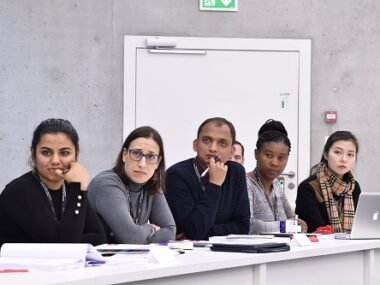In today’s interconnected world, academic sponsorship plays a crucial role in shaping education, fostering international collaboration, and enabling students to pursue higher education opportunities. Academic sponsorship involves financial and resource support provided by governments, institutions, corporations, or individuals to help students and researchers achieve their academic goals. This system has evolved over time, and in 2024, it continues to influence global education trends, benefiting both students and the sponsoring entities. As education becomes increasingly globalized, academic sponsorship has become a powerful tool for building bridges across borders and creating opportunities for students worldwide.
The Importance of Global Academic Sponsorship
Academic sponsorship provides students with the financial resources needed to pursue higher education. Without sponsorship, many students, particularly from low-income backgrounds, would struggle to access quality education. Sponsorship programs help reduce financial barriers, allowing students to focus on their studies rather than the burden of tuition fees and living expenses.
In addition to individual benefits, academic sponsorship enhances international academic mobility, promoting cultural exchange and fostering global cooperation. Students who receive sponsorship often attend prestigious institutions outside their home countries, contributing to a more diverse and inclusive educational environment. These international experiences expose students to different perspectives and ideas, which are essential for developing well-rounded global citizens. Moreover, sponsoring organizations—whether governments, corporations, or non-profits—benefit from supporting the next generation of skilled workers, researchers, and thought leaders.
Types of Academic Sponsorship
Several types of academic sponsorships exist, each with its own objectives and beneficiaries. These include government-sponsored scholarships, private-sector sponsorships, institutional grants, and non-profit or philanthropic initiatives.
Government-Sponsored Scholarships: Many governments sponsor scholarships as part of their foreign policy or development strategy. For example, the Fulbright Program in the United States and the Chevening Scholarships in the UK are well-known examples of government-sponsored academic opportunities. These scholarships often target international students, promoting diplomacy and cultural exchange while helping recipient countries enhance their educational capacity.
Private-Sector Sponsorships: Corporations often invest in academic sponsorships to cultivate future talent for their industries. These programs may focus on specific fields such as science, technology, engineering, and mathematics (STEM), business, or healthcare. Companies see these sponsorships as an opportunity to support students who may later contribute to the company’s growth and innovation. Examples include tech giants like Google, Microsoft, and IBM offering fellowships and internships to students excelling in technical fields.
Institutional Grants and Scholarships: Universities and educational institutions themselves often provide scholarships and grants to attract talented students. These programs can be merit-based, need-based, or targeted toward specific demographics, such as underrepresented minorities or women in STEM fields. The goal is to enhance the institution’s diversity and global standing by attracting students from a variety of backgrounds.
Non-Profit and Philanthropic Sponsorships: Non-profit organizations and foundations play a significant role in academic sponsorship by focusing on marginalized and underserved populations. These initiatives aim to provide educational access to students who may not have other financial means. Foundations like the Bill and Melinda Gates Foundation or the Mastercard Foundation offer large-scale sponsorships to students from developing countries, particularly in Africa and Asia.
Global Trends in Academic Sponsorship in 2024
In 2024, several trends are shaping the landscape of global academic sponsorship. These trends are influenced by technological advancements, changes in global economic priorities, and the evolving needs of the workforce. The following sections highlight key trends that are likely to define academic sponsorship this year.
- Focus on Sustainability and Climate Change
As climate change becomes an increasingly urgent global issue, academic sponsorship programs are increasingly geared toward sustainability and environmental studies. Governments, non-profits, and corporations are investing heavily in research and education related to climate change, renewable energy, and environmental conservation. Scholarships for students in these fields are growing, with institutions like the United Nations and the World Bank offering financial support to those pursuing degrees in environmental sciences and sustainable development.
For example, in 2024, several multinational corporations have initiated sponsorship programs aimed at students in climate science, green technology, and sustainable business practices. These programs are designed to foster innovation in sustainability while also addressing the growing demand for skilled professionals in these areas.
- Increased Focus on Diversity, Equity, and Inclusion (DEI)
In recent years, there has been a growing emphasis on diversity, equity, and inclusion (DEI) in academic sponsorship. In 2024, this trend has continued, with sponsorship programs actively seeking to address systemic inequities in education. Many scholarships and sponsorships are now specifically targeting underrepresented groups, including women, minorities, students from low-income families, and those from conflict zones or developing nations.
Programs that promote gender equality in education, such as those supporting women in STEM fields, are becoming more prominent. For example, UNESCO and various global tech companies are sponsoring scholarships specifically for women pursuing careers in engineering, computer science, and technology. These efforts are critical for addressing the gender gap in these traditionally male-dominated fields.
- The Rise of Digital and Remote Learning Sponsorships
The COVID-19 pandemic revolutionized the way education is delivered, accelerating the adoption of digital and remote learning technologies. In 2024, many academic sponsorships are now tailored to support students engaging in online education. As universities continue to offer hybrid or fully online degree programs, academic sponsorships are adapting to these changes by covering costs associated with digital learning tools, internet access, and virtual academic support services.
Sponsorships are also being created for students pursuing degrees in digital-related fields, such as data science, artificial intelligence, and cybersecurity. These areas are seeing growing demand, and organizations are keen to support students who can help meet the needs of an increasingly digitized global economy.
- Cross-Disciplinary and Global Research Collaborations
Another emerging trend in 2024 is the rise of cross-disciplinary research and global collaboration in academic sponsorship. Universities, governments, and private institutions are encouraging students and researchers to work on projects that span multiple disciplines, such as combining healthcare with artificial intelligence, or economics with environmental science. Sponsorship programs are supporting these collaborative efforts by funding research projects that address complex global challenges, such as public health crises or poverty alleviation.
In addition to funding students, some academic sponsorships are designed to bring together scholars from different countries to collaborate on these issues. For instance, the European Union’s Horizon Europe program funds cross-border research collaborations that involve universities, businesses, and other stakeholders from around the world.
Challenges Facing Global Academic Sponsorship
While academic sponsorship offers immense benefits, it also faces several challenges in 2024. These challenges are related to economic fluctuations, political dynamics, and the evolving nature of higher education.
Economic Uncertainty: Global economic instability, exacerbated by issues like inflation, rising costs of living, and post-pandemic recovery, has impacted the availability of academic sponsorships. Many governments and organizations have had to scale back on their sponsorship budgets, making it harder for students to secure funding. Economic uncertainty can also affect the willingness of corporations to invest in long-term academic sponsorships, particularly in industries undergoing rapid change.
Political Tensions and Restrictions: International relations and political dynamics can significantly affect academic sponsorship. Rising nationalism, immigration restrictions, and geopolitical conflicts may limit the ability of students to study abroad or receive sponsorships. For example, students from certain countries may face travel restrictions or visa challenges, making it difficult for them to pursue international scholarships. Moreover, funding from some governments may be redirected toward national priorities, reducing international academic opportunities.
Inequality in Access: Despite the growth of academic sponsorship, inequality in access remains a persistent issue. Students from marginalized backgrounds may still struggle to access sponsorships due to lack of information, application barriers, or biased selection processes. In some cases, students from rural or conflict-affected areas may lack the infrastructure needed to apply for or benefit from global academic sponsorship programs.
The Future of Global Academic Sponsorship
Looking ahead, global academic sponsorship is likely to continue evolving in response to technological, social, and economic changes. In 2024, there is increasing recognition that academic sponsorship must adapt to the changing needs of students and the global workforce. Greater collaboration between governments, educational institutions, and the private sector will be essential for addressing the challenges of tomorrow.
One potential development is the expansion of micro-scholarships and short-term sponsorships that focus on specific skills or certifications rather than traditional degree programs. These types of sponsorships can cater to students who need to quickly upskill or reskill for the demands of a rapidly evolving job market. Moreover, the focus on diversity and inclusion in sponsorship programs will likely continue to grow, as institutions and organizations strive to create more equitable educational opportunities worldwide.
In conclusion, global academic sponsorship in 2024 plays a pivotal role in shaping the future of education and international cooperation. Despite facing challenges such as economic uncertainty and political tensions, academic sponsorship remains a critical tool for providing access to education, fostering innovation, and promoting global collaboration. As the world continues to change, so too will the landscape of academic sponsorship, creating new opportunities for students and societies alike.




